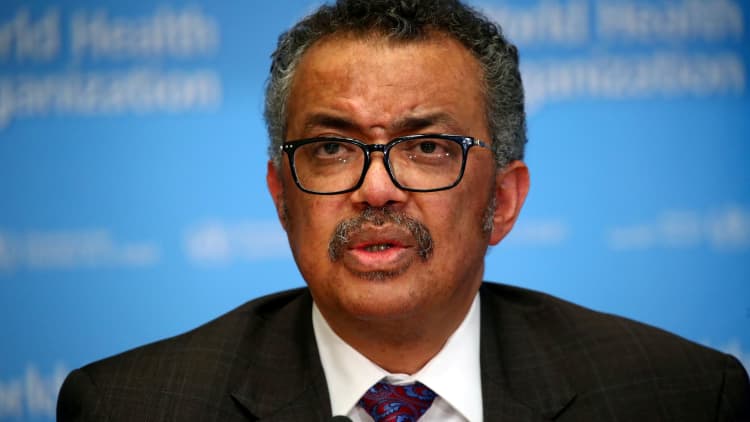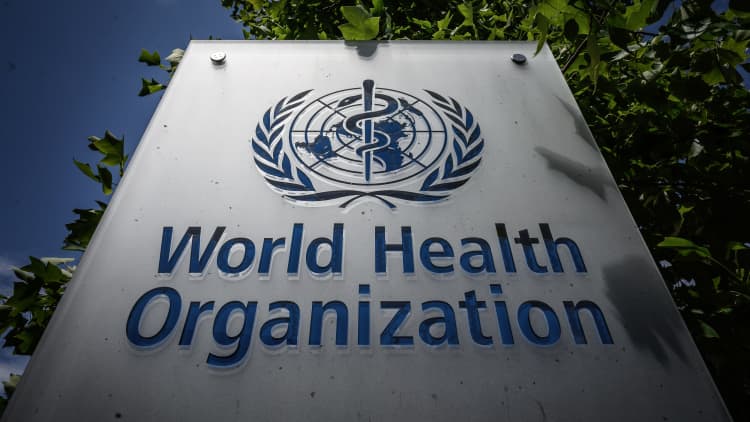
The World Health Organization warned Thursday there is no going back to the "old normal" as the coronavirus pandemic accelerates in the United States and poorer, developing countries.
Half of all Covid-19 cases reported so far are from the United States, Brazil and India, WHO Director-General Tedros Adhanom Ghebreyesus said during a news conference from the agency's Geneva headquarters. "It's completely understandable that people want to get on with their lives, but we will not be going back to the old normal."
The United States has the worst outbreak in the world with more than 3.8 million Covid-19 cases so far, according to data from the WHO. That's followed by Brazil with 2.1 million cases and India with 1.1 million cases, according to the organization. There are more than 14 million cases globally.
Even though cases are high in the U.S., Brazil and India, there's still a chance to bring the virus under control, said Dr. Maria Van Kerkhove, head of the WHO's emerging diseases and zoonosis unit.
"It can be turned around and there are tools that all countries have that can do that," she said. "It takes tremendous will, it takes tremendous leadership and the work of all people to be part of the solution."
The WHO recommends that people wear masks as a way to slow the spread of the virus. Scientists say the virus can spread through respiratory droplets that pass when an infected person coughs or sneezes. Studies suggest the masks may serve as a helpful barrier to spreading infection.
The agency also recommends people wash their hands regularly, maintain their distance from others and avoid going to crowded places. If you have a fever, cough and difficulty breathing, seek medical attention, but call by telephone in advance if possible and follow the directions of your local health authority, the WHO said.
Tedros urged world leaders and the public to make these "good choices," adding the decisions could be the "difference between life and death for someone you love." As long as the virus is circulating, everyone is at risk, he said.
"Just because cases may be at a low level where you live, that doesn't make it safe to lower your guard," he said. "Don't expect someone else to keep you safe. We all have a part to play in protecting ourselves and one another."
The comments come two days after President Donald Trump warned that the coronavirus pandemic in the U.S. will probably "get worse before it gets better." He is now urging Americans to wear masks to contain the outbreak after resisting them for months.

"We're asking everybody that, when you are not able to socially distance, wear a mask," he said Tuesday at a White House news briefing. "Whether you like the mask or not, they have an impact, they have an effect, and we need everything we can get."
The U.S. reported 71,695 new cases of the coronavirus on Wednesday, again topping 70,000 in a single day after four days of slightly lower numbers. The country's total case count is rapidly approaching 4 million, according to data compiled by Johns Hopkins University.
Wednesday's spike sent the seven-day average to a fresh all-time high of 67,429 new cases per day over the past seven days, up more than 6% compared with last week, according to a CNBC analysis of data from Johns Hopkins. The seven-day average dropped slightly for the first time in weeks on Tuesday, according to CNBC's analysis.
On Wednesday, Dr. Anthony Fauci, the nation's top infectious disease expert, said it is unlikely the coronavirus will ever be eradicated.
It's still possible world leaders and public health officials could work to bring the virus down to "low levels," the director of the National Institute of Allergy and Infectious Diseases said during an interview with the TB Alliance.
Dr. Mike Ryan, executive director of the WHO's health emergencies program, echoed those remarks on Thursday. He said the world has to find a way to function with the virus.
"We have to live with this virus. We will not be able to eliminate or eradicate this virus in the foreseeable future," Ryan said.



